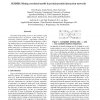Free Online Productivity Tools
i2Speak
i2Symbol
i2OCR
iTex2Img
iWeb2Print
iWeb2Shot
i2Type
iPdf2Split
iPdf2Merge
i2Bopomofo
i2Arabic
i2Style
i2Image
i2PDF
iLatex2Rtf
Sci2ools
ICDM
2009
IEEE
2009
IEEE
SLIDER: Mining Correlated Motifs in Protein-Protein Interaction Networks
Correlated motif mining (CMM) is the problem to find overrepresented pairs of patterns, called motif pairs, in interacting protein sequences. Algorithmic solutions for CMM thereby provide a computational method for predicting binding sites for protein interaction. In this paper, we adopt a motif-driven approach where the support of candidate motif pairs is evaluated in the network. We experimentally establish the superiority of the χ2 -based support measure over other support measures. Furthermore, we obtain that CMM is an NP-hard problem for a large class of support measures (including χ2 ) and reformulate the search for correlated motifs as a combinatorial optimization problem. We then present the method SLIDER which uses local search with a neigborhood function based on sliding motifs and employs the χ2 -based support measure. We show that SLIDER outperforms existing motif-driven CMM methods and scales to large protein-protein interaction networks.
| Added | 23 May 2010 |
| Updated | 23 May 2010 |
| Type | Conference |
| Year | 2009 |
| Where | ICDM |
| Authors | Peter Boyen, Frank Neven, Dries Van Dyck, Aalt-Jan van Dijk, Roeland C. H. J. van Ham |
Comments (0)

